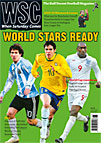 Looking forward to a half-time video link-up with the England camp? Karl Sturgeon isn't
Looking forward to a half-time video link-up with the England camp? Karl Sturgeon isn't
It’s easy to be cynical about modern football, so I’d like to begin with a positive statement – the World Cup is great. Even if you missed out on FIFA’s wheeze of selling match tickets in South African supermarkets and won’t be there yourself, the competition gives the summer shape. I doubt I’m the only person impatiently awaiting the World Cup wallcharts so that barbecues, beach trips and weddings can be slotted into the gaps between group deciders, or quarter-finals B and C.
But even for those of us who’ll be taking root on the couch, travelling no further than our bedrooms to chart the Ivory Coast’s progress, the TV coverage will throw up annoyances. You know what to expect by now: the adverts that strain to place cars or combine harvesters at the centre of football culture; the fierce patronising of an entire continent (who’ll be first to roll out Ladysmith Black Mambazo or a shot of a barefoot child glancing hopefully skyward?); the inevitable appearance of Michael Owen as a pundit. But there’s something even worse. It will crop up at half time, as well as pre- and post-match, at every single game. Even if England underwhelm as badly as four years ago, they’ll be pushed to be less inspiring than a presenter announcing, with false enthusiasm, that “our reporter caught up with Steven Gerrard to assess the mood in the camp”.
The modern football interview has become so compressed, by the pressures of sponsors, press officers and eager FA disrepute panels as much as by time, that it’s seldom more than a tepid exercise in stating the obvious. It’s filler, aural wallpaper, the broccoli that viewers have to chomp down before they’re allowed pudding. Who actually watches these things and expects to hear something enlightening or unfamiliar? It’s not hard to predict the inevitable training camp interviews. Some token respect for the gaffer. A rueful comment about being away from the WAGs, followed immediately by an acknowledgement that no one minds because, really, we’re here to concentrate on our football, Guy.
It’s not just international football, of course. It’s just that the singular nature of the international game makes this fluff harder to ignore – the freewheeling, jabbering hubbub of the Premier League and its attendant threads of narrative and argument are momentarily silenced. The domestic game partly sates its need for interviews by dragging breathless players off the pitch and straight in front of a board crammed with sponsor logos. Here it’s easy to have sympathy, because even the finest public speaker would struggle for wit and erudition immediately after being chased around a field for 90 minutes by Christopher Samba. So instead, most of the chattering is done by the managers.
It’s a relatively recent development that the manager has been promoted to key orator, head-of-state, protagonist-or-antagonist, but it’s one the media and the managers themselves have taken to with gusto. When seeking a replacement for Owen Coyle, one of the reasons the Burnley board supposedly passed up on the well-regarded Sean O’Driscoll was that the board didn’t believe he had the media presence to manage a Premier League team. Instead they chose Brian Laws, not long sacked by Sheffield Wednesday.
Laws seems well-meaning but hapless, and spends a lot of his screen-time blinking in glum confusion at the carnage in the Clarets’ penalty box. Of course, plenty of strong, charismatic personalities are drawn to management, but in the past those characters were remarkable for standing out among the voiceless morass of their peers. Charisma was an optional, if useful, extra, not a key attribute.
Ironically, when there was less demand for managers to speak, TV afforded them greater time and respect. Interviews with Clough, Busby and Shankly were expansive, sit-down affairs. They were given time to develop responses; idiosyncrasies and obsessions were allowed to shine through. The problem now is that the interview is a contractual obligation. Clubs must send someone to offer brief soundbites before and after every game, even if they’ve nothing in particular to say, and even if the manager is not talking to a particular media outlet – which is why Match of the Day viewers regularly enjoy the opinions of Mike Phelan.
The exceptions to this cautious norm are usually good viewing, but still relatively guarded considering what the key players in such a competitive industry must really think. Take Kevin Keegan’s interview in that Elland Road corridor in 1996. There’s no doubting Keegan means what he’s saying, but what he actually says isn’t quite as deranged as legend would make you believe. He’d love it if Newcastle won the title? I’m willing to risk my reputation by suggesting Keegan was already quite invested in winning the title long before Stuart Pearce’s honour was brought into question.
In the interests of balance, the interview does have its strictly utilitarian uses, for viewers as well as TV producers: interviews tend to be sized perfectly for toilet breaks. Or, if you’re anything like me, for keeping your wallchart up to date.
From WSC 280 June 2010